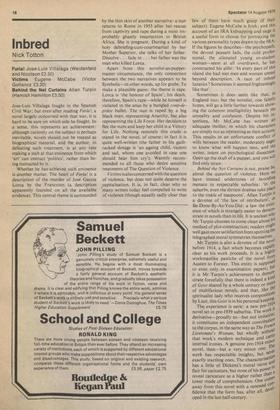Inbred
Nick Totton
Furia! Jose-Luis Villalaga (Weidenfeld and Nicolson £3.50) Victims Eugene McCabe (Victor Gollancz £3.20) Behind the Net Curtains Allan Turpin (Hamish Hamilton £3.50)
Jose-Luis Villalaga fought in the Spanish Civil War; but even after reading Furia!, a novel largely concerned with that war, it is hard to be sure on which side he fought. In a sense, this represents an achievement: although curiosity on the subject is perhaps inevitable, novels should not be treated as biographical material, and the author, in defeating such treatment, is at any rate making a stab at that eminence from which 'art' can instruct 'politics', rather than being instructed by it.
Whether he has achieved such eminence is another matter. The heart of Furia! is a description of the murder of Jose Garcia Lorca by the Francoists (a description apparently founded on all the available evidence). This central theme is surrounded
by the thin skin of another narrative: a nun returns to Rome in 1953 after her rescue from captivity and rape during a most improbably ghastly insurrection in British Africa. She is pregnant. During a kind of holy debriefing-cum-courtmartial by her Mother Superior, she talks of her father. Dissolve . . . fade in . . . her father was the man who killed Lorca.
Apart from this novelist-as-puppetmaster circumstance, the only connection between the two narratives appears to be Symbolic—in other words, up for grabs. To make a plausible guess: the theme is rape. Lorca is 'the honour of Spain': his death, therefore, Spain's rape—while he himself is violated in the anus by a bungled coup-degrace bullet. The nun is raped by a big black man, representing Anarchy, but also representing the Life Force. Her decision to flee the nuns and keep her child is a Victory for Life. Nothing remotely this crude is stated in the novel, of course; in fact it is quite well-written (the father in his guiltracked dotage is 'an ageing child, violent and sad, whom one avoided in case one should hear him cry'). Warmly recommended to all those who desire sensitive treatments of The Question of Violence.
Victims is also concerned with the question of violence, but does not quite deserve the capitalisation. It is, in fact, clear why so many writers today feel compelled to write of violence (though equally sadly clear that few of them have much grasp of their subject). Eugene McCabe is Irish; and this account of an IRA kidnapping and siege is a useful form to choose for portraying the various personality types drawn to the IRA. If the figures he describes—the psychopath. the devout peasant lads, the cold professional, the alienated young ex-student woman—seem at all overdrawn, he has constructed his alibi: 'In every part of this island she had met men and women unreal beyond description. A race of inbred lunatics? Sometimes it seemed frighteninglY like that'.
Sometimes it does seem like that. in England too; but the novelist, one faintly hopes, will go a little further towards showing the coherent intelligibility beneath the unreality and confusion. Despite his intentions, Mr McCabe has written an adequate thriller, in which his characters are simply not as interesting as their actions. This results in an unfortunate conflict of wills between the reader, moderately eager to know what will happen next, and the writer, intent on psychological dissection. Open up the skull of a puppet, and you will find only straw.
Behind the Net Curtains is not, praise ho, about the question of violence. Here we have instead undertones of brooding menace in respectable suburbia: 'in the subJurbs, even the dirtiest dramas take Place to the tinkle of teaspoons'. Allan TurPin is a devotee of 'the law of retribution', °r Be-Done-By-As-You-Did: a law the existence of which is strangely easier to demonstrate in novels than in life. It is unclear vvhY Mr Turpin chooses to come clean about his method of plot-construction; readers might well gain more satisfaction from spotting the telegraphed moral symmetries themselves. Mr Turpin is also a devotee of the rlov,e before 1914, a fact which becomes raPidlY clear as his work proceeds. It is a highlY workmanlike pastiche of the novel froold Austen to Forster. This entity is suPP°set to exist only in examination papers:. b° it is Mr Turpin's achievement to demon, strate forcefully that there is indeed a kin° of Geist shared by a whole century or ril°ree of multifarious novels, and that, like rlis spiritualist lady who receives composition by Liszt, this Geist is in his personal keePill,g4' The experience is eerie: a new pre-191., novel set in pre-1939 suburbia. The work is derivative—proudly so—but not imitativen; it constitutes an independent contributi°, to the corpus, in the same way as The Frencfit Lieutenant's Woman, but wholly vvirh°1j, that work's modern technique and Cr internal ironies. A genuine pre-I914 novel, then—but a very minor one. 1-'1_1. work has respectable insights, but exactly startling ones. The characterisanocin has a little of Dickens's moral verve arito flair for caricature, but none of his power 3 reveal caricature as a higher rather thanes lower mode of comprehension. One corn_ away from this novel with a renewed coei;, fidence that the form has, after all, dev oped in the last half-century.


























 Previous page
Previous page